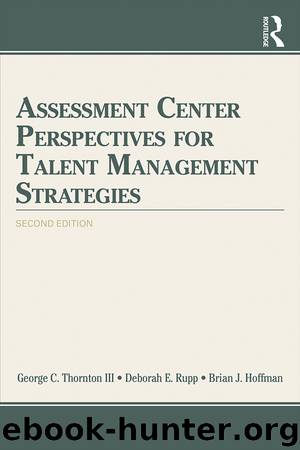Assessment Center Perspectives for Talent Management Strategies by George C. Thornton & Deborah E. Rupp & Brian J. Hoffman

Author:George C. Thornton & Deborah E. Rupp & Brian J. Hoffman [George C. Thornton]
Language: eng
Format: epub
ISBN: 9781317597797
Publisher: Routledge
Assessors/Facilitators
The role of staff members in a development assessment center is somewhat different from the role of assessors in a promotion or diagnostic assessment center. Where training is the ultimate goal, staff members are tasked with helping participants learn new skills. Therefore, they are often called development facilitators, as opposed to assessors.
Development facilitators should have many of the skills needed for all kinds of assessment centers: they must be able to observe and record behavior, to accurately classify behaviors into dimensions and tasks, and to articulate these observations to other facilitators and the participants. Some skills needed by assessors in evaluative assessment centers are not as important for facilitators. They may not be required to make overall judgments about the effectiveness of behaviors on the dimensions or in the tasks, or to make predictions about long-range success in the organization. On the other hand, facilitators must have effective teaching skills, such as excellent oral communication, empathy, and listening ability. They must be able to provide effective feedback about behaviors displayed in the simulation exercises in a supportive manner. Some research has found that it is, at times, difficult to find individuals who have all of these diverse skill sets (i.e., assessing and coaching) and has suggested that some individuals do the assessing and others do the coaching (Atchley, Smith, & Hoffman, 2003).
Facilitators can be managers or human resource staff members from the organization, or training and development consultants from outside the organization. They may also be more specialized “executive coaches.” Consultants can often give valuable insights into effective group dynamics, and since they have no ties to the organization, they can observe behaviors objectively. They have experience in diverse organizations and can give new points of view.
Download
This site does not store any files on its server. We only index and link to content provided by other sites. Please contact the content providers to delete copyright contents if any and email us, we'll remove relevant links or contents immediately.
| Administration & Medicine Economics | Allied Health Professions |
| Basic Sciences | Dentistry |
| History | Medical Informatics |
| Medicine | Nursing |
| Pharmacology | Psychology |
| Research | Veterinary Medicine |
The Art of Thinking Clearly by Rolf Dobelli(10454)
The 5 Love Languages: The Secret to Love That Lasts by Gary Chapman(9789)
Mindhunter: Inside the FBI's Elite Serial Crime Unit by John E. Douglas & Mark Olshaker(9324)
Becoming Supernatural by Dr. Joe Dispenza(8201)
Nudge - Improving Decisions about Health, Wealth, and Happiness by Thaler Sunstein(7692)
The Road Less Traveled by M. Scott Peck(7594)
Mastermind: How to Think Like Sherlock Holmes by Maria Konnikova(7323)
Enlightenment Now: The Case for Reason, Science, Humanism, and Progress by Steven Pinker(7306)
Win Bigly by Scott Adams(7184)
The Way of Zen by Alan W. Watts(6601)
Factfulness: Ten Reasons We're Wrong About the World – and Why Things Are Better Than You Think by Hans Rosling(4734)
The State of Affairs by Esther Perel(4711)
Gerald's Game by Stephen King(4641)
Man's Search for Meaning by Viktor Frankl(4583)
The Confidence Code by Katty Kay(4251)
Thinking in Bets by Annie Duke(4218)
The Healing Self by Deepak Chopra(3568)
Hidden Persuasion: 33 psychological influence techniques in advertising by Marc Andrews & Matthijs van Leeuwen & Rick van Baaren(3552)
The Worm at the Core by Sheldon Solomon(3486)
